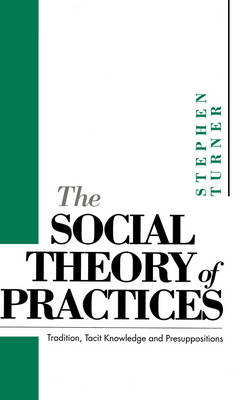
The Social Theory of Practices
Tradition, Tacit Knowledge and Prepositions
Seiten
1994
Polity Press (Verlag)
978-0-7456-1372-7 (ISBN)
Polity Press (Verlag)
978-0-7456-1372-7 (ISBN)
- Titel z.Zt. nicht lieferbar
- Portofrei ab CHF 40
- Auch auf Rechnung
- Artikel merken
This book presents the first analysis and critique of the idea of practice as it has developed in the various theoretical traditions of the social sciences and the humanities. The concept of a practice, understood broadly as a tacit possession that is a shareda by and the same for different people, has a fatal difficulty, the author argues.
This book presents the first analysis and critique of the idea of practice as it has developed in the various theoretical traditions of the social sciences and the humanities. The concept of a practice, understood broadly as a tacit possession that is 'shared' by and the same for different people, has a fatal difficulty, the author argues. This object must in some way be transmitted, 'reproduced', in Bourdieu's famous phrase, in different persons. But there is no plausible mechanism by which such a process occurs. The historical uses of the concept, from Durkheim to Kripke's version of Wittgenstein, provide examples of the contortions that thinkers have been forced into by this problem, and show the ultimate implausibility of the idea of the interpersonal transmission of these supposed objects. Without the notion of 'sameness' the concept of practice collapses into the concept of habit. The conclusion sketches a picture of what happens when we do without the notion of a shared practice, and how this bears on social theory and philosophy. It explains why social theory cannot get beyond the stage of constructing fuzzy analogies, and why the standard constructions of the contemporary philosophical problem of relativism depend upon this defective notion.
This book presents the first analysis and critique of the idea of practice as it has developed in the various theoretical traditions of the social sciences and the humanities. The concept of a practice, understood broadly as a tacit possession that is 'shared' by and the same for different people, has a fatal difficulty, the author argues. This object must in some way be transmitted, 'reproduced', in Bourdieu's famous phrase, in different persons. But there is no plausible mechanism by which such a process occurs. The historical uses of the concept, from Durkheim to Kripke's version of Wittgenstein, provide examples of the contortions that thinkers have been forced into by this problem, and show the ultimate implausibility of the idea of the interpersonal transmission of these supposed objects. Without the notion of 'sameness' the concept of practice collapses into the concept of habit. The conclusion sketches a picture of what happens when we do without the notion of a shared practice, and how this bears on social theory and philosophy. It explains why social theory cannot get beyond the stage of constructing fuzzy analogies, and why the standard constructions of the contemporary philosophical problem of relativism depend upon this defective notion.
Stephen Turner is the author of several previous books including The Search for a Methodology of Social Science and Sociological Analysis as Translation.
1. Practices and their Conceptual Kin. 2. Practices as Causes.
3. Practices as Presuppositions.
4. Transmission.
5. Change and History.
6. The Opacity of Practice.
Notes.
Index.
| Erscheint lt. Verlag | 27.1.1994 |
|---|---|
| Verlagsort | Oxford |
| Sprache | englisch |
| Maße | 154 x 228 mm |
| Gewicht | 255 g |
| Themenwelt | Sozialwissenschaften ► Soziologie |
| ISBN-10 | 0-7456-1372-1 / 0745613721 |
| ISBN-13 | 978-0-7456-1372-7 / 9780745613727 |
| Zustand | Neuware |
| Informationen gemäß Produktsicherheitsverordnung (GPSR) | |
| Haben Sie eine Frage zum Produkt? |
Mehr entdecken
aus dem Bereich
aus dem Bereich
Ein Grundproblem der Moderne | Die erste umfassende Studie zum …
Buch | Hardcover (2024)
Suhrkamp (Verlag)
CHF 44,75
1920/30 und die Gegenwart
Buch | Softcover (2024)
Springer Fachmedien (Verlag)
CHF 48,95
Bewegungsgeschichten von Queers of Color in Deutschland
Buch | Softcover (2024)
Assoziation A (Verlag)
CHF 25,20


